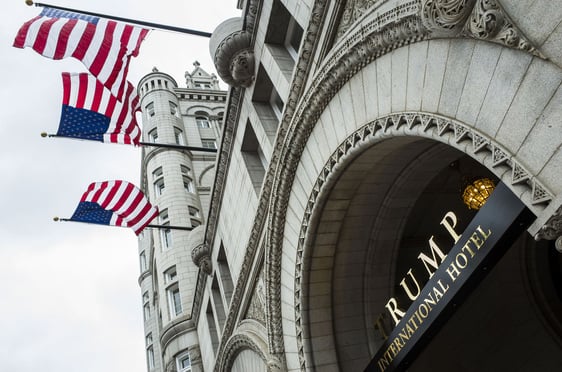NY Federal Judge Tosses Emoluments Suit Against Trump for Lack of Standing
A federal judge has tossed out a suit against President Donald Trump claiming that his vast array of business interests create conflicts of interest under the emoluments clauses of the U.S. Constitution, finding the plaintiffs lack standing to bring the suit.
December 21, 2017 at 05:46 PM
5 minute read
 Trump International Hotel in Washington, D.C. Photo Credit: Diego M. Radzinschi/ALM
Trump International Hotel in Washington, D.C. Photo Credit: Diego M. Radzinschi/ALM A federal judge has tossed out a suit against President Donald Trump alleging that his vast network of businesses are creating conflicts prohibited by the emoluments clauses of the U.S. Constitution, finding that the plaintiffs lack standing.
The decision Thursday from U.S. District Judge George Daniels of the Southern District of New York to dismiss claims that Trump has run afoul of the Constitution's anti-corruption provisions deals a victory to the Trump administration and a setback to the growing number of groups that have formed this year to call for Trump's impeachment.
Daniels also said in his ruling that the case presented a “nonjusticiable political question” and that Congress should be the branch of government responsible for sanctioning or challenging Trump's actions if they do indeed violate the emoluments clauses.
The Citizens for Responsibility and Ethics in Washington, a nonprofit government watchdog organization, filed the suit in federal court in Manhattan just days after Trump's inauguration alleging that he violated both the domestic and foreign emoluments clauses by accepting payments for leases at Trump Tower in Manhattan held by foreign-owned entities; for hotel stays and property transactions with foreign entities; and from foreign broadcasters for picking up reruns of the “The Apprentice.”
► Need help staying on top of litigation against the Trump administration? Sign up here to receive Trump Watch, a new email briefing, straight to your in-box.
CREW alleged that it was injured by diverting time and resources to file the suit against Trump, an argument that some legal observers considered a weak one to establish standing in the case.
In April and May, amended complaints were filed in the case to add a group of restaurant workers, a New York City hotelier and restaurateur and a Washington, D.C.-based hospitality employee who books embassy functions and other events involving foreign guests to the ranks of the plaintiffs.
The new plaintiffs said that because Trump's hotels and restaurants continue to receive payments from foreign governments in violation of the emoluments clauses and that his continued financial interest in his companies put them at a competitive disadvantage.
Among the alleged violations the plaintiffs cited were that the Kuwaiti embassy in Washington, D.C. had decided to move an event from the Four Seasons to the Trump International Hotel, spending between $40,000 and $60,000 in the process.
Also among the plaintiffs' allegations is the claims that, after Trump pledged in February to honor the “One China” policy that the Chinese government granted trademark protection to the Trump name — something that Trump had been trying unsuccessfully to obtain since 2006.
But in his ruling in favor of the government to dismiss the case, Daniels said while the emoluments clauses prevent Trump from accepting gifts, they do not prevent Trump's businesses from competing with the plaintiff businesses in the case, and that the plaintiffs failed to show how Trump businesses hurt their competitive standing.
“Even before defendant took office, he had amassed wealth and fame and was competing against the hospitality plaintiffs in the restaurant and hotel business,” Daniels said. “It is only natural that interest in his properties has generally increased since he became president.”
Turning to CREW's argument for standing, Daniels said the nonprofit's “entire reason for being” is to investigate corruption and highlight the role of money in politics, Daniels said, and thus making statements or filing suit against the president alleging violations of the constitution is how is typically spends its resources.
“Under CREW's unbounded definition of standing, for example, a news organization could
sue the president by alleging that one or more of his statements forced it to divert resources away from a different story it might have pursued,” the judge said.
Daniels also agreed with the government's argument that the question of whether or not Trump has violated the emoluments clauses is one for Congress to answer, and that the plaintiffs' claims are “not ripe for judicial review.”
Jean Lin, James Powers and Brett Shumate of the Main Justice's Civil Division appeared for the administration.
“The Department of Justice appreciates the Court's ruling and its conclusion that Plaintiffs lack standing to pursue these claims in federal court, that Plaintiffs' claims do not fall within the zone of interests of the Emoluments Clauses, and that Plaintiffs' claims involve political questions that cannot be resolved in federal court.”
In a statement issued following the ruling, Noah Bookbinder, CREW's executive director, stuck by the organization sticks by its argument that Trump has violated the emoluments clauses. He said the group's legal team is weighing its options and determining how it will proceed.
The plaintiffs' legal team includes Deepak Gupta and Jonathan Taylor of Gupta Wessler; and Cohen Milstein Sellers & Toll partners Joseph Sellers, Daniel Small and George Farah and associate Robert Braun.
“While today's ruling is a setback, we will not walk away from this serious and ongoing constitutional violation,” Bookbinder said. “The Constitution is explicit on these issues, and the president is clearly in violation.”
This content has been archived. It is available through our partners, LexisNexis® and Bloomberg Law.
To view this content, please continue to their sites.
Not a Lexis Subscriber?
Subscribe Now
Not a Bloomberg Law Subscriber?
Subscribe Now
NOT FOR REPRINT
© 2025 ALM Global, LLC, All Rights Reserved. Request academic re-use from www.copyright.com. All other uses, submit a request to [email protected]. For more information visit Asset & Logo Licensing.
You Might Like
View All
DOJ Supports Appointing US Judge Backed By Trump to Review Mar-a-Lago Documents
3 minute read

Jay-Z, Quinn Emanuel Say AAA Offers Only 'Token' Black Arbitrators
Trending Stories
- 1Who Are the Judges Assigned to Challenges to Trump’s Birthright Citizenship Order?
- 2Litigators of the Week: A Directed Verdict Win for Cisco in a West Texas Patent Case
- 3Litigator of the Week Runners-Up and Shout-Outs
- 4Womble Bond Becomes First Firm in UK to Roll Out AI Tool Firmwide
- 5Will a Market Dominated by Small- to Mid-Cap Deals Give Rise to a Dark Horse US Firm in China?
Who Got The Work
J. Brugh Lower of Gibbons has entered an appearance for industrial equipment supplier Devco Corporation in a pending trademark infringement lawsuit. The suit, accusing the defendant of selling knock-off Graco products, was filed Dec. 18 in New Jersey District Court by Rivkin Radler on behalf of Graco Inc. and Graco Minnesota. The case, assigned to U.S. District Judge Zahid N. Quraishi, is 3:24-cv-11294, Graco Inc. et al v. Devco Corporation.
Who Got The Work
Rebecca Maller-Stein and Kent A. Yalowitz of Arnold & Porter Kaye Scholer have entered their appearances for Hanaco Venture Capital and its executives, Lior Prosor and David Frankel, in a pending securities lawsuit. The action, filed on Dec. 24 in New York Southern District Court by Zell, Aron & Co. on behalf of Goldeneye Advisors, accuses the defendants of negligently and fraudulently managing the plaintiff's $1 million investment. The case, assigned to U.S. District Judge Vernon S. Broderick, is 1:24-cv-09918, Goldeneye Advisors, LLC v. Hanaco Venture Capital, Ltd. et al.
Who Got The Work
Attorneys from A&O Shearman has stepped in as defense counsel for Toronto-Dominion Bank and other defendants in a pending securities class action. The suit, filed Dec. 11 in New York Southern District Court by Bleichmar Fonti & Auld, accuses the defendants of concealing the bank's 'pervasive' deficiencies in regards to its compliance with the Bank Secrecy Act and the quality of its anti-money laundering controls. The case, assigned to U.S. District Judge Arun Subramanian, is 1:24-cv-09445, Gonzalez v. The Toronto-Dominion Bank et al.
Who Got The Work
Crown Castle International, a Pennsylvania company providing shared communications infrastructure, has turned to Luke D. Wolf of Gordon Rees Scully Mansukhani to fend off a pending breach-of-contract lawsuit. The court action, filed Nov. 25 in Michigan Eastern District Court by Hooper Hathaway PC on behalf of The Town Residences LLC, accuses Crown Castle of failing to transfer approximately $30,000 in utility payments from T-Mobile in breach of a roof-top lease and assignment agreement. The case, assigned to U.S. District Judge Susan K. Declercq, is 2:24-cv-13131, The Town Residences LLC v. T-Mobile US, Inc. et al.
Who Got The Work
Wilfred P. Coronato and Daniel M. Schwartz of McCarter & English have stepped in as defense counsel to Electrolux Home Products Inc. in a pending product liability lawsuit. The court action, filed Nov. 26 in New York Eastern District Court by Poulos Lopiccolo PC and Nagel Rice LLP on behalf of David Stern, alleges that the defendant's refrigerators’ drawers and shelving repeatedly break and fall apart within months after purchase. The case, assigned to U.S. District Judge Joan M. Azrack, is 2:24-cv-08204, Stern v. Electrolux Home Products, Inc.
Featured Firms
Law Offices of Gary Martin Hays & Associates, P.C.
(470) 294-1674
Law Offices of Mark E. Salomone
(857) 444-6468
Smith & Hassler
(713) 739-1250







